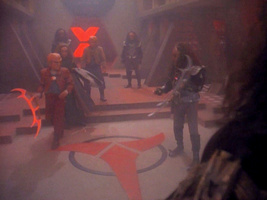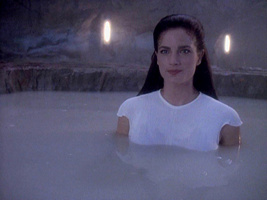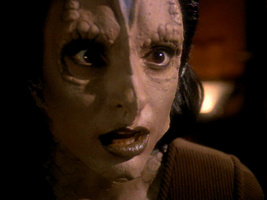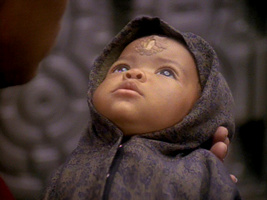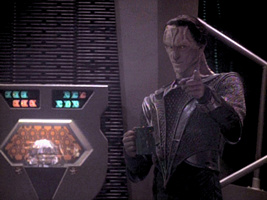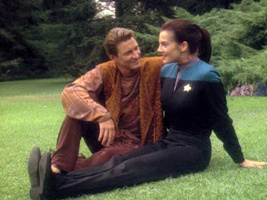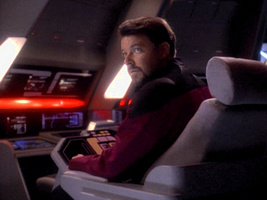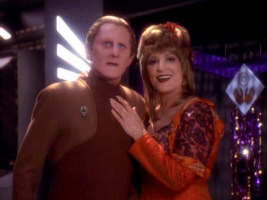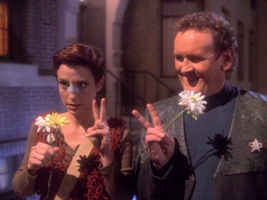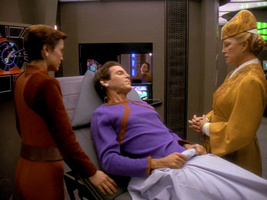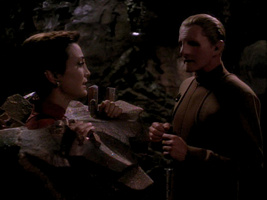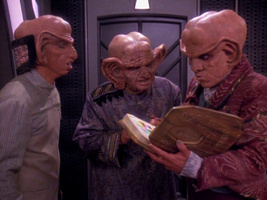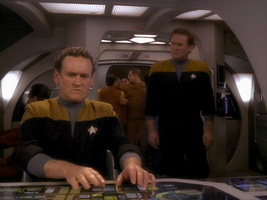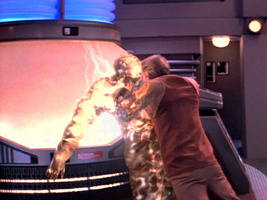Deep Space Nine (DS9) Season 3 Guest Reviews
Season 1Season 2Season 3Season 4Season 5Season 6Season 7
The Search I/II
Synopsis
Stardate 48212.4: Synopsis in main DS9 listing
Review
"The Search" is a two-part continuation of the second season finale "The Jem'Hadar." Someone at Paramount must have sent a memo that (1) viewers were bored of all the Bajoran politics, and (2) these little runabouts aren't cutting it. In short, we need to "reboot."
The Dominion threat revealed in "The Jem'Hadar" and further developed here handles the first issue by taking DS9 politics to a new level. The runabout issue is fixed by the addition of the USS Defiant -- a tiny Federation warship equipped with a Romulan cloaking device. Initially the cloaking device is controlled by a Romulan officer (T'Rul) and is to be used only in the Gamma Quadrant, but it doesn't take many episodes for those niceties to fall by the wayside.
The story in the first episode starts very slowly; it takes about 22 minutes before the eponymous "search" even gets going. Before that, there's a lot of talking and musing and not a lot of substance. When the search finally gets going, it proceeds oddly. Quark is tapped to negotiate with the Karemma (first seen in DS9: "Rules of Acquisition"), who apparently know nothing of their Dominion overlords. The Karemma send the Defiant to a communications relay station on Callinon VII, where Dax and O'Brien find another set of coordinates before getting trapped under a force field. Rather than fight Dominion patrols, Sisko simply abandons them to the Jem'Hadar and moves on to the next coordinates! Before they can arrive, his unprecedented caution goes unrewarded when the Jem'Hadar are able to use anti-proton scans to detect the cloaked Defiant, board, and seize her.
Meanwhile, "The Search" is underpinned by a massive coincidence. While Sisko and his crew are on a hapless, weird quest to find the Founders, Odo happens to see a picture of the Omarion Nebula, is mysteriously, obsessively drawn to it. And when Odo and Kira travel to a rogue planet inside the nebula, they discover what everyone else is looking for: the homeworld of the Founders. Of course, at first we don't realize that; we just know that Odo has found the homeworld of his own people, the Changelings. It is only with the climax of the second episode that we realize that the Changelings and the Founders are one and the same. However, our ignorance doesn't make the coincidence any less convenient in the end.
The story of the second episode is split between Odo and Kira on the Changeling homeworld and the rest of the crew back on Deep Space Nine. Both groups encounter mysteries. While Odo tries to learn about his people, Kira discovers a subterranean power source and hidden base, which ultimately proves to be a Dominion command center. Back on Deep Space Nine, meanwhile, Sisko and the crew are confronted with a Federation in closed-door negotiations that rapidly result in an alliance with the Dominion. Unfortunately, the cost of peace is ceding the wormhole and Bajor to the Dominion while provoking a war with the Romulans. Indeed, this universe is so wrong it's a relief when Kira and Odo discover that Sisko and the others are actually being held prisoner in the underground station, and the whole negotiated alliance was merely a Dominion simulation. In the end, the resolution of Sisko's mystery is so simple it would a let down, if it weren't coupled with the revelation that the Changelings are the Founders.
"The Search" marks the brief introduction of Lt. Cmdr. Michael Eddington, who will have a larger, recurring role. Eddington is given charge over Starfleet security on the station and Odo immediately resents his presence. The two-part episode also marks the introduction of the Female Changeling, the leader of the Dominion. We also have a cameo from Admiral Alynna Nechayev (in the Dominion simulation) --- one of my favorite admirals from TNG.
Despite its various flaws, this two-part episode has a lot going for it. There's a good deal of suspense and although the mysteries are either too easy (the Dominion simulation), or too much of a coincidence (the Changelings are the Founders), they are engaging. Finally, the episode sets up elements for the major story arcs of the rest of the series: the conflict between the Federation and the Dominion. If this two-parter was envisioned as something of a "reboot" for the series, it proved to be a worthwhile reboot.
Annotations
- Remarkable quote: "I admit this link of yours is appealing. But you see, I already have a link - with these people." (Odo)
- Remarkable dialogue: "When did I start thinking of this Cardassian monstrosity as home?" (Sisko) - "I think it happened last Thursday." (Jake)
- Remarkable ship: The Defiant: Introduced here for the first time, the Defiant is remarkable for a Starfleet vessel in several ways: (1) It's a tiny, but over-powered warship developed to fight the Borg, (2) it has a cloaking device, and (3) its warp drives are built into its primary hull. The ship is a critical part of the series up through its destruction at the second battle of Chin'toka (DS9: "The Changing Face of Evil").
Rating: 7 (John Hamer)
The House of Quark
Synopsis
Stardate not given: Synopsis in main DS9 listing
Review
This is actually quite a cute episode, I found myself laughing out loud in more than one place. The episode is split between an A-plot and a B-plot.
The B-plot is relatively weak. Sadly, the Keiko O'Brien character hasn't gone anywhere good since she was introduced in TNG: "Data's Day," an episode that included the day of her marriage to Miles O'Brien on the USS Enterprise-D. For all of the advances women should have made in the egalitarian 24th century, most of the women of Star Trek find themselves stuck backward, subordinate, and traditional roles. Keiko is the rule, rather than the exception. When Miles is promoted to be DS9's chief of operations, Keiko follows her husband, even though it means sacrificing her own career. A botanist, she has no role on a deep space station. In DS9: "A Man Alone," she decided to keep herself busy by opening a school for the station's children --- reinforcing a traditional stereotype by taking a job historically reserved for women. In this episode, the threat of the Dominion has caused families to flee the station, forcing the school closed. Rather than pursue her own interests, Keiko merely mopes, and Miles finds himself trying to figure out something for his wife to do. Initially he imagines she'll be happy creating an arboretum as a hobby, but eventually he realizes that he needs to get her back to work in her own field (botany), even if it means that she and Molly will be away on Bajor for months at a time. I'm not sure that this resolution makes up for the subordinate role the character has been forced to assume since she was introduced --- especially given the fact that she'll now be raising Molly single-handed.
Fortunately the unfortunate B-plot hardly detracts from the cute A-plot. The main story is a clever interaction between two unlikely Star Trek cultures: the Ferengi and the Klingons. Although the idea that Quark could head a Klingon noble house is laughable --- and is deliberately played up for comedic effect --- everything in the episode appears to be in keeping with established Klingon custom. The conflict between Grilka and D'Ghor is clever, and it's a nice touch that Quark has the capacity to uncover the underlying financial threat D'Ghor is making to Grilka's house by sullying himself with the financial ledgers, Ferengi style. Of course, it makes all the sense in the world that Klingons can answer Ferengi charges with trials by combat --- an answer Quark is particularly unsuited to face. Quark's solution cleverly shows D'Ghor is dishonorable and Gowron responds by discommendating D'Ghor (a nice nod to TNG: "Reunion"). Grilka is especially well-rounded and likeable. All in all, this was nice development for Quark's character, and Gowron's cameo actually showed him to be a wise leader for once.
Annotations
- Remarkable dialogue: "The House of Kozak is gone. For the time being, it will be known as...as the House of..." (Gowron) - "Quark" (Quark) - "Quirk..." (Gowron) - "Quark!" (Quark) - "...The House of Quark." (Gowron)
Rating: 7 (John Hamer)
Equilibrium
Synopsis
Stardate not given: Synopsis in main DS9 listing
Review
Jadzia's behavior at the beginning of this episode is so confrontational, there's no question something is seriously wrong. Her hallucinations are meant to be terrifying, but (frankly) they bored me. After some scans from Dr. Bashir, we immediately find out that the problem is Jadzia's "isoboromine levels" (yawn!) Once the problem is a bunch of Treknology, we might as well just fix it using the transporter. Instead they decide to fix it by visiting the Trill homeworld, which means everyone gets in the Defiant for a "road trip." On the way Jadzia tells Dr. Bashir about her fear of doctors, along with boring sob stories about her life as a Trill initiate. Meanwhile, the hallucinations continue (and continue to leave us ho-humming).
The Trill doctor at the Symbiosis Commission seems bizarrely disinterested (and ignorant) of Jadzia's condition, but a Trill "Guardian" turns out to be equally bizarrely well informed about her condition. Things pick up when it turns out that the underlying mystery is actually a murder involving one Jadzia's past hosts (and simultaneously when Jadzia's condition becomes critical). However, the solution (that Dax had a secret past host) is let out of the bag prematurely, leaving the duration of the episode for a long-winded (and totally predictable) exposition between Dr. Bashir, Sisko, and the Trill physician.
Although this episode was an opportunity to get to know more about the Dax character and about the Trill, it was largely squandered by failing to explore more than totally predictable and dull tropes.
Annotations
- Remarkable quote: "If you want to know who you are, it's important to know who you've been." (Dax)
Rating: 2 (John Hamer)
Second Skin
Synopsis
Stardate 48244.5: Synopsis in main DS9 listing
Review
At first blush, the concept underlying "Second Skin" doesn't look promising. It was only the previous year in TNG: "Face of the Enemy," that we had Counselor Troi kidnapped and surgically altered to look like a Romulan and now we have Kira kidnapped and transformed into a Cardassian. (We even have the involvement of the two powers similar intelligence services, with the Cardassian "Obsidian Order" being substituted for the Romulan "Tal'Shiar.") However, as silly as the premise of "Face of the Enemy" was, the premise of "Second Skin" is even worse. Troi was merely surgically altered to appear Romulan -- we aren't forced to imagine that her iron-based half-Betazoid/half-human blood was replaced with copper-based Romulan blood. But "Second Skin," we are expected to believe that Cardassians and Bajorans, despite radically different appearances, are similar enough biologically that a Cardassian can be medically altered to be indistinguishable from a Bajoran. (Indeed, the original premise, written out of the episode as filmed, was apparently to leave the question open as to whether Kira actually might be Cardassian.)
Thankfully, like "Face of the Enemy," "Second Skin" manages to be a much better episode than its premise. This is because with Legate Tekeny Ghenor we begin to see a different side to the Cardassians than we had seen before. In the episode as realized, neither Kira (nor the audience) are ever convinced that she is actually a Cardassian; only Ghenor is fooled. And when Ghenor reveals to Kira that he's secretly part of the Cardassian Underground in order to try to save her, she immediately realizes that Ghenor is the subject of the plot and she is merely the bait. In the end, Ghenor is a very likable character and it's nice that we will revisit him in season 5 (DS9: "Ties of Blood and Water").
The episode's B-plot involves Sisko's attempt to rescue Kira from Cardassia. In the course of the episode, Garak essentially sheds all pretense of being a "simple tailor" by proving that he knows some extremely high-level (and current) Cardassian security protocols. It can be argued that he does so to save his own skin, having been black-mailed by Sisko to come along on the rescue mission, but the question lingers why Garak would have told Sisko that the Obsidian Order was holding Kira in the first place.
Annotations
- Remarkable dialogue: "Mr. Garak, I believe that's the first completely honest thing you've said to me" (Sisko) - "How perceptive of you, Commander" (Garak).
Rating: 5 (John Hamer)
The Abandoned
Synopsis
Stardate not given: Synopsis in main DS9 listing
Review
To me this episode is DS9's version of TNG: "I Borg", but nowhere as brilliant.
In a nutshell, comedy relief and fan favourite Quark get his hands on some alien wreckage and amongst it he discovers a baby. The folk onboard try to figure out the species and discover its growing at an alarming rate. To cut a long windy story short - it's a Jem'Hadar.
The similarities with "I Borg" are thus - captured enemy youth who is threat but in a controllable situation; Star Fleet officers wondering how to deal with such person, and the potential to use this person to study or as a weapon but some object due to such acts being rather unethical or immoral.
The difference there is that where Picard and Guinan's prejudice is based from actual experience of torment of the Borg and what they did versus Geordi and Crushers moral and ethic debates because their interactions with the Borg teenager reveals a confused, if not ignorant young person, here there is only one person who stands up for the boy - Odo. Everyone else is hell bent convinced that the being should be either chopped up, killed, or left to rot. Odo's attempt to change the mind of all is repelled with blatant scepticism, and even a verbal derision by Kira. All are convinced that the Jem'Hadar are mindless cold blooded killers.
The fact that Odo fails, and that he concedes his defeat comes across as a case of "I told you so" and "We are proven right!". In fact there is an overwhelming feeling that Odo must fail and the Jem'Hadar kid must have no redeeming features. The net result makes an interesting idea fall flat and the episode cold of feeling for yay or nay over the lad. I also felt disgusted the way Odo was treated - he tried to make an effort, see if he could make a difference but everyone else was already made up with their opinion and in a way hoped he would fail.
DS9 tried to show and portray the Jem'Hadar to be utterly ruthless, to be 'mindless' like living robots, and I don't mind the idea but in typical Star Trek style, it's blown to bits by the Jem'Hadar being shown to have some 'individuality' in future episodes "Hippocratic Oath" and "Rocks and Shoals". Hell they even WORK with Sisko and his mob in "To The Death" - all in the name of telling stories. Hence why this story is rather poor, as well as the above criticisms of Odo.
One other thing that I find disgusting and is a recent discovered fact; Avery Brooks who directed this episode said "for me, it was very much a story about young brown men, and, to some extent, a story about a society that is responsible for the creation of a generation of young men who are feared, who are addicted, who are potential killers." Not the fact that people in general are frustrated with society putting them in their place, right? Making them potential killers hmmm? No matter their creed and colour?
I am a "brown man" and i find this statement insulting - for a start it pigeon holes us as "this is all we will be" - the fact that Odo failed, and everyone was EAGER to give up on him and to see Odo look a fool, says what exactly? That "brown" men are not worth treating, saving, guiding, or helping? In addition MR BROOKS, what about all the poor Vietnam vets who were spurned by YOUR society who ended up in terrible conditions eh? Turning to drugs and crime and even suicide? The fact that the 'enlightened' Federation showed no pity to Odo's failure or making an effort to help suggests what?
Was going to give this 2/10 but after this discovery, Nil Point mate!
Rating: 0 (Chris S)
The Abandoned
Synopsis
Stardate 48301.1: Synopsis in main DS9 listing.
Review
This episode suffers from some serious pacing errors. We've seen a mysterious baby that ages rapidly before (TNG: "The Child"). However, last time the effect was much more believable (and creepy). This time we go from baby to 8-year-old equivalent before Dr. Bashir even bothers to call Sisko. The baby is equivalent of an 18-year-old before anybody really starts paying attention to him --- the growth rate is simply not believable as presented.
Upon reaching maturity, the baby's mystery is over and everyone realizes we're dealing with a Jem'Hadar. Immediately we have the moral question about whether this is a person with rights or an enemy to be studied, but when the impassioned arguments are presented the Jem'Hadar has had so little screen time, we hardly care. We haven't had a chance to get invested in the Jem'Hadar because up until this point, far too much screen time has been squandered on the throw-away B-plot concerning "Jake and the Dabo-girl."
The second half of the episode, which focuses on Odo's attempt to teach the young Jem'Hadar to be an individual, is an improvement over the first half because we finally get to know the young Jem'Hadar, but that development is far too little too late. According to Sisko's final supplemental station log: "Starfleet has expressed disappointment over what it considers to be a missed opportunity to learn more about the Jem'Hadar." That's a pretty fair summary for this episode.
Annotations
- Remarkable quote: "Sixteen years old, and dating a dabo girl. Godspeed, Jake." (O'Brien)
- Remarkable fact: This episode introduces Ketracel-white, although the enzyme/drug is, as yet, unnamed.
Rating: 3 (John Hamer)
Civil Defense
Synopsis
Stardate not given: Synopsis in main DS9 listing.
Review
Overall, this is a low-budget episode, shot entirely on the station with only Gul Dukat as a guest star. The situation with the computer program is initially amusing, becomes somewhat tense, and ultimately becomes annoying. The best part is when Dukat beams aboard Ops to taunt Kira and the others, only to fall victim himself when he tries to beam away, making the computer think he's abandoned his post and triggering a recorded dressing down from his superior.
Given the dozen or so recordings encountered prior to that point, Gul Dukat must have spent months recording messages for every eventuality! (It's probably too obscure a reference, but I'm reminded of the old "Saturday Night Live" sketch where Dana Carvey plays TV-anchor Tom Brokaw who is pre-taping broadcasts for every potential scenario, "Tragedy today, as former President Gerald Ford was eaten by wolves.")
The episode follows three groups: (1) Sisko, O'Brien, and Jake below decks, (2) Kira, Dax, Dr. Bashir, and ultimately Garak and Dukat in Ops, and (3) Odo and Quark in Security. Considering how little is happening with the first two groups, it's noteworthy to mention that even less is happening for Odo and Quark. They literally have nothing to do and do nothing the entire episode.
For all these shortcomings, the episode fails to be really bad; it just never gets very good.
Annotations
- Nitpicking: Remarkably, when Sisko orders the station evacuation, he has Kira direct everyone to the runabouts and the Defiant and Jake argues that he should come along with his father and O'Brien because they're too far away. However, it should be obvious that the station's population can't be crowded into 4 small vessels, and most everyone would evacuate on its Cardassian lifeboats and Starfleet ASRV escape pods.
- Remarkable quote: "Garak --- groveling in a corner --- that alone makes my trip worthwhile." (Dukat)
Rating: 4 (John Hamer)
Meridian
Synopsis
Stardate 48423.2: Dax falls in love with a guy on a planet that keeps disappearing. Dax wants to disappear with him.
Review
I only watched this episode because of the silly side plot that was Quark and Jeffery Combs. And I only watched THAT because I wanted to see Quark in bed saying "I've been waiting for you" *bite*", because that's the funniest thing I've seen in DS9 for a long time.
But yeah, other than that little tidbit, the episode is boring and unbelievable. I'm surprised that within a day or so, Dax is ready to give up her life as a joined Trill and her Starfleet career, just to be a spirit with this dude she just met. And that's pretty much ALL THAT HAPPENS. The whole romance thing only really works if it isn't someone she only met a few days ago.
In my opinion, half of this episode is worse than "Silicon Avatar". I'd give it a one for the other half, but even that's feeling too generous.
Rating: 0 (Hon. David Kulessa)
Meridian
Synopsis
Stardate 48423.2: Synopsis in main DS9 listing
Review
What tripe, Jeffrey Combs saves this from being unwatchable. Dax spends maybe a few hours with a guy and suddenly wants to resign her commission with Starfleet and give up her life to be with him in whatever capacity is possible once he, the other inhabitants of his world, and the planet himself vanish into some non-corporeal dimension. One wonders how the people penning this episode thought this could be credibly presented without depicting Jadzia in an unbelievable way. And it doesn't help the guy playing Deral isn't the best of actors either, so the entire romance fails to convince.
But as I said, this episode features the first of many Star Trek appearances for the brilliant Jeffery Combs playing an alien obsessed with getting it on with a holographic Major Kira, attempting to bribe Quark into getting a holographic representation of her makes for some very humorous scene's culminating in a Quark-headed Kira attempting to seduce Tiron in the holosuite, after Kira and Odo catch on to Quark's plans. A lowly 1 star is all this episode deserves, courtesy of the B-plot.
Annotations
- Remarkable statements:
- "Of all the stories I've done for Star Trek, 'Meridian' is my least favorite." -Hilary J. Bader, the writer for this episode
- "I don't think anyone likes the show. I don't think we liked the show. This one just went wrong. It never jelled." -Ronald D. Moore
- "A classic case of making it up as we go. I don't want to talk about it." -Visual Effects supervisor Glenn Neufeld
Rating: 1 (Cameron)
Meridian
Synopsis
Stardate 48423.2: Synopsis in main DS9 listing.
Review
This episode is bad all around. The B-plot takes place on the station as Quark attempts to covertly acquire Kira's image for a custom holosuite program commissioned by a shady client. There is some humor here, which means that this isn't the worst B-plot of the series. The same can't really be said for the A-plot.
The A-plot takes place on a 30-person planet called Meridian that is shifting between dimensions. As a general rule, I pretty much always hate Star Trek episodes where the entire planetary population can fit in a shuttlecraft --- at this scale it's not really a "planetary" emergency. This 30-person planet, however, is significantly lamer than most. Meant as a paradise, Meridian is actually just dull. There's nothing of interest naturally, physically, or in the culture of the people --- the writers give us nothing to care about at all. The whole is just a backdrop for Dax's romance with Deral, Meridian's primary scientist. Unfortunately, there is likewise nothing of interest to Deral's character, and to make the picture perfect, the romance between Dax and Deral is likewise utterly uninteresting.
Deral initially decides he'll leave Meridian to join Dax in the Alpha Quadrant, but when that proves inconvenient, Dax makes the absurd decision to leave Starfleet and shift into a non-corporal dimension for 60 years, in order to stay with this boring guy she hardly knows. I don't dislike the Dax character in general, but by the time the planet starts to shift away, I'm pretty much ready to write Dax off. "Bye, Dax! If you really want to do this, good riddance." When the planet leaves without her, I was almost sad we were left with her.
Still, as bad as this is (and it is bad), I can't think this is TNG: "Sub Rosa" bad. So, I'm giving it a "1".
Annotations
- Remarkable dialogue: "I was admiring your markings. Are they decorative?" (Deral) - "No. Are yours?" (Dax) - "No. If you don't mind me asking, how far down do they go?" (Deral) - "All the way." (Dax)
Rating: 1 (John Hamer)
Defiant
Synopsis
Stardate not given: Synopsis in main DS9 listing
Review
Yet again another great idea, another clever plot, ruined by banality and ineptness.
The twist here is that the Riker Duplicate from TNG: "Second Chances" takes the Defiant in a very clever deception. Working for the Marquis, he steals the Defiant, with Kira aboard. At that point, there is potential for a lot; the Marquis using the Defiant as a raider, space battles, thrilling chases and such.
However instead, the entire episode deflates faster than an expose soufflé, with loads of talk and counter talk. There is one swift weak space battle and the dreaded Defiant is as effective in battle as a snowball against a furnace. The mission that Tom takes them on is to expose something big going on in Cardassian space - and the surprise twist is a boring one.
Like with the twist, everything else here is so-so; Tom Riker is Riker but just a wee bit unguided and still dull, the ease how Kira sabotages the ship, said Kira berating and berating her opinions which change as swift as the wind making you loathe rather than love her, the way the Defiant whilst cloaked can be conveniently detected, the manner that Sisko knows what's going on and how he easily sees though Riker's tactics, the Cardassians once again cookie cutter idiots, enhances the tedium and bore of this episode.
They could have turned this into an epic story of hide and seek, a clash with Riker, or the Defiant used as a raider and causing headaches for all concerned - but instead its just to discover a wee dirty secret, once exposed, the entire story falls flat. In a way this episode is more reminiscing of TNG: "The Wounded" only not as well done and an opportunity squandered.
3/10 - like the episode - third decent.
Annotations
- Nitpicking:
- The way the ship is stolen - the deception by Tom Riker is clever, but the warp core breach is so easily whipped up and so easily accepted! The same tactic used by the Bynars way back in TNG: "11001001". Doesn't anyone learn anything?!?!?
- Other things ruin this episode - Kira is a prisoner, and she OBVIOUSLY would do something to either escape or sabotage their mission - so why not keep her stunned or jettison her into an escape pod? Or even bind her? Surely the Defiant carries hand cuffs!!
- Remarkable scene: Tom Riker revealing his true identity - by whipping off the sides of his beard to expose a goatee! Too reminiscent of Garth Knight (Michael's evil twin brother) in Knight Rider and a haven of jokes made about evil versions thanks to goatee beards in South Park!
- Interesting but implausible fact: Sisko points out that he played a key part in designing the Defiant - infact knowing a lot about its key systems. How would a commander be so involved in the building of a prototype ship? More to the point if he is so involved, would he not spot a fake warp core breach?
- Remarkable prop: Quantum torpedoes are used from the Defiant for the first time - considering their power stated in the DS9 Technical Manual, their effect is rather limp.
- Interesting fact: Jonathan Frakes hoped that Tom Riker would be resurrected in a future episode - one where Kira holds her promise to rescue him from the Cardassian prison. However the producers were not interested - infact, his character was in a pitch letter of ideas NOT to be explored. Hmmm wonder why? ;-)
Rating: 3 (Chris S)
Defiant
Synopsis
Stardate not given: Synopsis in main DS9 listing
Review
"Defiant" is a rather satisfying episode. We return to galactic politics (a hallmark of the better DS9 episodes) and are reminded that just because the Dominion threat looms on the horizon, it doesn't mean old players like the Maquis are out of business. As the Cardassians have become more fleshed out, we now realize that the Obsidian Order (the Cardassian intelligence service) is operating independently of the Central Command (the Cardassian military). Once again, we see that the Federation is most interested in stability, and Sisko is willing to work with Gul Dukat to destroy the Defiant (if necessary) to keep the peace. But when the opportunity to play the Central Command against the Obisidian Order presents itself, Sisko prefers to devise a political solution that gets his ship back intact.
The return of the Thomas Riker builds nicely on his introduction in TNG's "Second Chances," and the fact that the individual is Thomas (rather than William) is a nice, initial twist. Thomas's desire to differentiate himself from his doppelganger makes his conversion to the Maquis plausible, and Kira's assessment of him --- that he remains more Starfleet than terrorist --- is more plausible still.
The Cardassian plot Riker attempts to uncover sets up the future activities of the Obsidian Order (and Tal'Shiar) against the Dominion, which will be developed in "The Die is Cast." And the battles in this episode finally illustrate the Defiant's firepower; its engagements against the Jem'Hadar in "The Search," by contrast, had been lack-luster at best.
Annotations
- Remarkable quote: "Tough little ship." (Thomas Riker)
Rating: 7 (John Hamer)
Fascination
Synopsis
Stardate not given: Synopsis in main DS9 listing
Review
This is not Star Trek, that's not a comment on Deep Space Nine itself but just this episode: Trash. This is a bad romantic comedy where the actors thought it would be a laugh to parody Star Trek characters while whining about their relationship problems over the course of some silly Bajoran festival.
The addition of Lwaxana Troi doesn't help matters, one wonders why they persisted with her character after TNG, she was a nuisance then when pestering Picard and (s)mothering Deanna, there's simply little point in bringing the character back just to force some stupid romance plot with Odo on us. And the Bareil/Nerys story is equally stupid and, IMO unrealistic.
But of course, we find out every one's under Lwaxana's influence, leading to a humorous scene where everyone is horny and in the same room trying to get IT on if you know what I mean, and I think you do.
But all the same, this is just a rubbish episode, no doubt the cast and crew thought it may have been a good idea at the time to do something light hearted, but there could've been other ways to have done it without making the episode nearly unbearable.
I'm very, VERY tempted to give this a zero, especially after the pitiful "Meridian" screened a week before, but while that was just idiotic scripting in it's treatment of Jadzia, this episode is just a harmless farce, so it gets a 1.
Annotations
- Remarkable statements:
- "In some ways, it (the episode) works very nicely. And in some ways...you know." -Ira Steven Behr
- (Regarding this episode) "I thought it was embarrassing." -Armin Shimmerman
- "(The episode was) memorable for not quite pulling off what it attempted to do." -Alexander Siddig
Rating: 1 (Cameron)
Fascination
Synopsis
Stardate not given: Synopsis in main DS9 listing.
Review
Pretty much the instant Lwaxana Troi steps off the shuttle, you know things are going to be bad. This unfortunate character ultimately makes nine appearances (6 in TNG; 3 in DS9). Only one of these (TNG: "Half a Life") is worthwhile; many others (e.g., DS9: "The Muse") are among the franchise's worst offerings. "Fascination" falls squarely in this latter camp. There's no reason Counselor Troi's mother should ever be on DS9, but I guess we should be thankful that she steered clear of the Delta Quadrant and Voyager.
(As if Lwaxana wasn't enough, Keiko's back from Bajor, and she's just as pissy as if she never left. Poor Miles.)
The general premise of the episode is DS9's attempt to revisit the drunken characters explored in TNG: "The Naked Now" and TOS: "The Naked Time," but this time around is far and away the worst of the bunch. Ultimately, every minute of this episode is torture and there are no redeeming elements. I happily consign it to the franchise's dregs with a perfect "0."
Annotations
- Remarkable quote: "Peldor joi, chief, you look terrible." (Quark)
Rating: 0 (John Hamer)
Past Tense I/II
Synopsis
Stardate 48481.2: Synopsis in main DS9 listing
Review
"Past Tense" fits the general Star Trek genre, but it's a particularly odd outing for Deep Space Nine. The Defiant is back at Earth for no particularly good reason, other than to set up the episode's time travel premise. Often an episode filmed in 1995 would see our crew travel back to that time period (e.g., TOS: "Tomorrow is Yesterday," "Star Trek IV: The Journey Home," VOY: "Future's End"). "Past Tense," by contrast is set in 2024, which was nearly three decades in the original audience's future.
Normally I'd be thankful for that bit of originality. Unfortunately, in this case, the writers fail to give us a glimpse of the Star Trek universe's near future. Other than Jadzia's time in Chris Brynner's apartment, we see nothing of the year 2024 outside the dilapidated Sanctuary District. The so-called "sanctuary" for homeless people is the focus of the episode, but as a future historical prediction, it seems unlikely. Why would every major U.S. city rope off valuable real estate to create lawless zones for squatters? Since the zones are effectively lawless, what's to stop residents from simply burning them down?
The point, of course, is to be preachy, Star Trek style, by making the point that Americans need to address the problem of homelessness, instead of just ignoring it. As the police keep reminding Sisko, that's easier said than done. The episode reminds us that many of the homeless are mentally ill. But even Sisko decides to ignore the plight of these individuals in order to focus attention (and sympathy) on people who could work but are simply unemployed. One of the sanctuary residents asks Sisko, "Don't you get it, there are no jobs." That possibility seems vastly more realistic than Sisko's play for national sympathy. In other words, if the government in 2024 actually were exiling people who are perfectly fit to lawless zones, the underlying economic situation probably includes a chronic surplus in the labor market. If so, what the world of 2024 needs is a way to create jobs; not just publicity for the plight of the unemployed.
If the history were cool and the cause were handled well, we may well be able to forgive the fact that the time travel here is totally absurd, even by Star Trek standards. The fact that Sisko changes the past wipes out the Federation. Bizarrely, however, this doesn't happen in the Defiant's "present" immediately after Sisko's time jump, even though anything Sisko did in the past is long since done in the Defiant's present. Instead, the changed future happens only after the point in the episode where the important historical figure Gabriel Bell dies, changing history. This effect is completely different from what we normally see in Star Trek, e.g., TOS: "The City on the Edge of Forever," where incursions alter the timeline immediately. (As an additional insult to injury, just as the writers fail to show us much of anything in 2024, they likewise fail to do anything with the alternate timeline. Earth is a void and we're told nothing beyond the fact that there's apparently a Romulan outpost on Alpha Centauri.)
While Sisko and Dr. Bashir are raising awareness about homelessness, Kira and O'Brien are attempting to rescue them by beaming into different timelines. This is meant as comic relief, but it's never really funny. Even though they don't have enough "chroniton particles" to check all the timelines, they decide to guess --- and fortunately guess right! --- rather than simply acquiring records from one of the later times and using those to trace the change in the timeline. (They could potentially even get those records from the Earth they are orbiting in their own, alternate present, if they decided to check.)
"Past Tense" is meant to be a weighty and dramatic 2-part episode, but it doesn't achieve half of what it sets out to do. TOS: "The City on the Edge of Forever" seems like the clear inspiration, but this ain't no city on the edge of forever.
Annotations
- Remarkable quote: "Twenty-first century history isn't one of my strong points. Too depressing." (Dr. Bashir)
Rating: 3 (John Hamer)
Life Support
Synopsis
Stardate 48498.4: Synopsis in main DS9 listing
Review
"Life Support" is one of many medical ethics episodes in Star Trek. TNG's "Ethics," filmed just three years earlier (and also with a teleplay by Ronald D. Moore) comes immediately to mind. "Ethics" also had odd problems, but at least the choices were not clear cut. And in the TNG version we had a conflict between a responsible physician who put her patients first and used only proven procedures (Dr. Beverly Crusher) and a radical and irresponsible physician willing to gamble her patient's lives on experimental procedures in order to further the science of medicine (Dr. Toby Russell). In "Life Support," by contrast, Dr. Bashir plays both roles and his choices always seem clear cut (even when he chooses wrong). And while Bashir enjoys initial success as he walks down Toby Russell's path, he quickly learns that he would have preferred to stay on Beverly Crusher's path.
The fact that Vedek Bareil Antos is the patient means we have some investment in the character. Bareil is Kira's love interest and he'd already appeared in six previous episodes. However, any concern we might have over risking his life is somewhat mitigated by the fact that he starts off the episode dead, and both Kira and the audience have started to accept his loss. But Dr. Bashir's radical treatment unexpectedly resurrects Bareil and from this moment on the medical gambles feel like playing at a casino with the house's money --- we'd already lost it once, so we're much more willing to go for broke. The critical moment comes when Dr. Bashir mentions an experimental drug treatment called "vasokin," which has an unacceptable potential to degrade Bareil's organs. Given that Bareil's priority is the overriding treaty under negotiation, the fact that he wants to gamble his life on the drug should come as no shock to Bashir; if Bashir felt the risk was unacceptable, it was irresponsible to mention the drug. Later, when the drug has the predicted consequences --- Bareil's organs, including half his brain, are eventually degraded and have to be replaced with synthetic alternatives --- Bashir's path is again clear. And by the time it dead ends, Kira's plea to replace the remaining real half of Bareil's brain with a positronic implant becomes grotesquely absurd. Anyone should understand, without having to be told explicitly, that if you "replace" a person's entire brain with a robot brain, you have killed the person!
Meanwhile, the politics are equally clear cut. Kai Winn remains irredeemably evil. She's ready to sacrifice Bareil (who is, after all, a political enemy) to gain a successful treaty, but she is just as eager to use him as a scape goat, should the negotiations fail.
While the A-plot is literally death-and-life dramatic, the B-plot is a comedic farce. Jake and Nog go on a double date, which Nog sabotages by laying his Ferengi sexism on super thick. Jake is rightly mortified and angry, but his father convinces him that it's important to be tolerant of Nog's bigotry. After all, Nog is a sexist because he's Ferengi; so if you hate him for it, you're a racist and being racist is worst than be sexist. No! Sorry, folks, that's not how it works.
In the end, the two halves of this episode don't fit well together and neither really works on its own.
Annotations
- Remarkable quote: "Just one thing, Jake. You're still pretty new at this dating business. Just promise me you won't do anything to embarrass me." (Nog)
Rating: 3 (John Hamer)
Heart of Stone
Synopsis
Stardate 48521.5: Synopsis in main DS9 listing
Review
The heart of this episode is not the inexplicable stone/crystal formation, slowly encasing Kira --- it's the twist that the woman being encased is not Kira at all, it's the female Changeling. I didn't anticipate the twist, but I found it rather satisfying. I imagined we were getting a typical Star Trek episode where two characters explore each other's emotions while they are trapped on a planet, usually in a cave, fighting some disembodied force that they ultimately defeat (e.g., TNG: "Final Mission"). The problem with an episode like TNG's "Final Mission," is that the audience never really believes that a character like Picard is going to die this way. Likewise, although Odo is convinced he's losing Kira, causing him to finally admit his love for her to her, the audience still is thinking that they're going to find a way to rescue her. The typical consequence, therefore, is that Odo is going to have to live with the fact that his secret is out of the bag and he and Kira are going to be uncomfortable; his crush may even be the end of their friendship.
When Kira responds to Odo's confession by admitting she loves him too, this is an immediately odd disconnect --- Kira's actual love just died the previous episode. This unexpected response tells Odo that something is very wrong, causing him to penetrate the female Changeling's ruse. However, unlike the phony scenario simulated by the Dominion a dozen episodes earlier "The Search" (Part 2), this one didn't smell wrong right from the start and its revelation is more satisfying. We haven't been thinking much about the Changelings or the Dominion since the beginning of the season, so it's a pleasant surprise to have them back and it makes sense that they remain focused on Odo. Finally, it's nice that Odo's secret love is revealed not to Kira herself, but to the female Changeling, Odo's enemy.
Back on the station, the B-plot once again focuses on Nog. This time, he's angling to get into Starfleet because he recognizes that he doesn't want to follow in his father's footsteps as a failed Ferengi businessman. Sisko is appropriately reluctant at first, but he's legitimately won over when he realizes that Nog is sincere.
Annotations
- Remarkable dialogue: "Well done, Odo. You really are quite a skillful investigator." (Female Changeling) - "And you're quite a skillful Changeling." (Odo)
- Remarkable fact: Odo's name is short for "Odo'ital," a Cardassian euphemism for "unknown sample," which literally means "nothing." It derives from his background as an unknown specimen in a Cardassian supervised, Bajoran lab.
Rating: 6 (John Hamer)
Prophet Motive
Synopsis
Stardate not given: Synopsis in main DS9 listing
Review
This is a stupid pointless episode, the Grand Nagus arrives on DS9 with a revised version of the 'Rules of Acquisition' which promote integrity, family, all that nonsense Ferengi's care nothing for of course ;)
But we find out the aliens in the wormhole altered Zek, as if it's there place to decide how to change people, of course they're ignorant of such things, and another silly vision sequence occurs with Quark convincing the 'Prophets' to return him the way he was. The B-plot is just Bashir believing he doesn't deserve some award then seems to have his heart set on it only to lose.
The whole episode just seemed amazingly unnecessary, the Nagus is back, Bashir's gonna get over losing the award he was never keen to win by the time of the next episode, and that's that. Sorry, I'm giving it 0.
Annotations
- Remarkably disturbing scene: I don't know about you, but I wasn't too comfortable watching Quark getting oo-mox in the opening sequence considering we ALL know what sort of allegory that is...
Rating: 0 (Cameron)
Prophet Motive
Synopsis
Stardate not given: Synopsis in main DS9 listing.
Review
There's no question that Zek is a funny character and that Wallace Shawn (best known for playing Vizzini in the Princess Bride) was an inspired casting decision. Zek is very much in keeping with DS9's decision to take the Ferengi --- TNG's would-be serious villains (who immediately became an unintended joke from their first appearance in TNG: "The Last Outpost") --- and transform them into an intended joke. That's making lemonade with your lemons and, by and large, it worked.
However, it's sad that writers don't seem to grasp the idea that funny characters are like sugar: it's nice to use them to sweeten a story but nobody wants to eat a whole bowl of just sugar. Unfortunately, "Prophet Motive" offers nothing of substance to sate our appetites. And, lacking substance, it fails to be truly funny or even very silly; instead it ends up being dumb.
In deciding to renounce profit and become charitable, Zek might be doing something ironic, but because it's so extreme and over the top, the potential for humor is spoiled. And with his re-writes of the "Rules of Acquisition," we have in miniature the same "sugar" problem with have with Zek in general: when introduced and when used for occasional effect, the "Rules" can be funny. When the writers dwell on the rules ad nauseum, they become tedious and stupid.
It comes as no more surprise to the audience that Zek's weird behavior has been caused by some outside force than it does to Quark when he first discovers the Orb. Quark immediately realizes that the Orb is the answer to Zek's behavior --- even though he's not sure how or why. Like Quark, the audience has the same realization, but I'm sure viewers hardly cared how or why the Orb was responsible. And when the "how and why" was revealed, I'm sure they still didn't care. Finally, the use of the "Deus ex Machina" of the "Prophets" (or wormhole aliens) is particularly flippant in this episode. If we ever wondered whether the writers had any idea where the Prophets story arc was even going before the 7th Season, this episode essentially settles the question: they did not.
I've hardly mentioned the "B story" about Dr. Bashir being nominated for an award that he doesn't win. This is because as tedious and dull as it was, it's really not worthy of mention.
Annotations
- Remarkable dialogue: "Rom! I've got a plan" (Quark) - "Does it involve me, brother?" (Rom) - "Not really." (Quark) - "Ah. I like it." (Rom)
- Nitpicking: I hate the fact that the "Grand Nagus" of the Ferengi doesn't even have his own Marauder starship. Why does he fly around in a shuttle-sized ship whenever he visits the station?
Rating: 2 (John Hamer)
Visionary
Synopsis
Stardate not given: Synopsis in main DS9 listing
Review
What's both great and frustrating about this episode is the process of unraveling the mystery through O'Brien's jumping forward in time. While Bernd has pointed out the positive aspects of this, I find that it forces the narrative of the episode to fall into a repetitive structure that detracts from the mystery with easy solutions, rather than heightening it by adding pieces into a larger mystery. Each future jump allows O'Brien to change the future and avoid the current problem, while offering a new puzzle that must be solved. While this keeps the action moving and does have an element of fun to it, this takes away from the feeling of real drama or real danger, because all we have to do is wait for the next jump to occur in order to observe what's going to happen, so that the current problem can be solved.
What's more, at the absolute height of the episode's drama, O'Brien's act of sacrifice is just glossed over. O'Brien's escalating health problem - one of the main points of drama, as a result of the time jumps - results in his death (if we had stuck around for a couple more minutes to witness it), and the solution is for his future self to return to the past to take his place. While commenting on how strange this feels over a game of darts, O'Brien and Bashir shrug away and trivialize this existential dilemma as if it was nothing. It would have been more satisfying, a better payoff to the escalating drama, and avoided trivializing and ignoring a very serious existential question, if O'Brien had mustered the strength to return to the past just barely alive.
One of the things that annoys me about this episode is that just when the audience might be realizing that there's some time paradoxes going on, the episode turns it into a joke by having O'Brien and Future O'Brien both say together, "I hate temporal mechanics." I wish that the writing would have created a slightly more intelligent take on the paradoxes of jumping forward into the future, rather than turning it into a joke and thus ignoring them. This non-chalance towards the matter detracted from the episode for me, just like the "Oh, this is simple, no biggie, this happens every day" attitude toward the techno-babble that explains O'Brien's time jumping problem (and eventually allows them to control it in a rather precise manner), although the techno-babble I at least expect.
The other thing that really annoyed me was that something that Bernd already pointed out, which is that none of the crew come up with the idea that the quantum singularity they detect, which is ORBITING the station no less, could be a cloaked Romulan ship. I mean, come on, it's ORBITING the station people! And as Bernd points out, with Romulans on the station no less! This is where the repetitive pattern of the episode, which dictates that O'Brien must solve all the problems by seeing what happens when he time jumps (identifying the Romulan ship by sight), denies our characters the intelligence they have, with what should have been an immediate identification of a cloaked Romulan ship.
Rating: 7 (Brandon Klassen)
The Adversary
Synopsis
Stardate 48962.5: Synopsis in main DS9 listing
Review
"The Adversary" is a thriller that provides some of the best suspense in all of Star Trek. The episode almost reminds me of ST:FC. The twists and turns throughout the episode keep it entertaining and interesting. The special effects seem to be rather good for a television show of its time.
Rating: 9 (Chris)
![]()
Proceed to DS9 Season 4 Guest Reviews






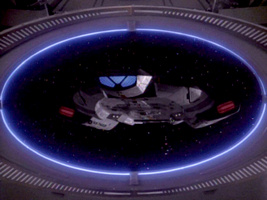
 "The Search I/II"
"The Search I/II"